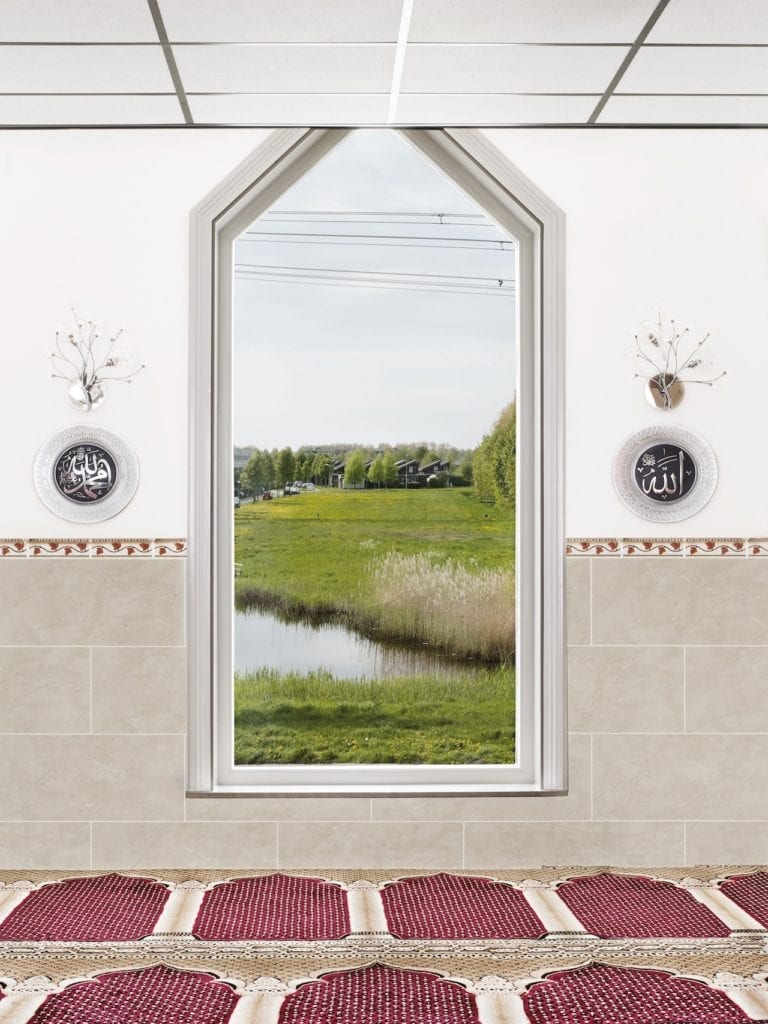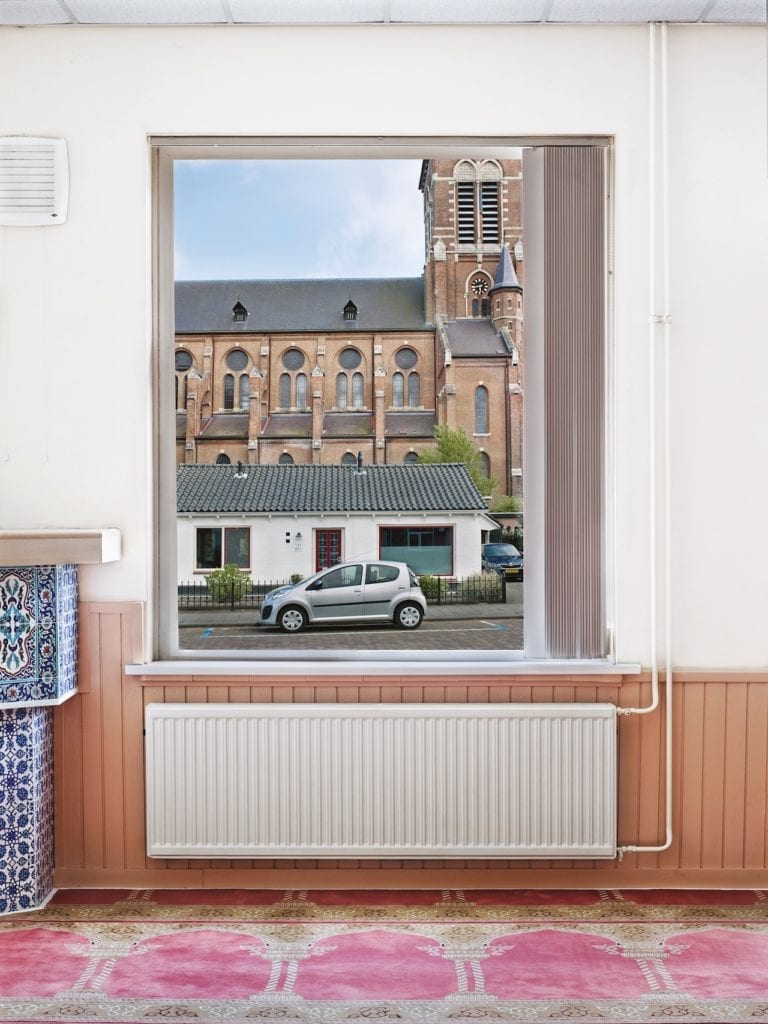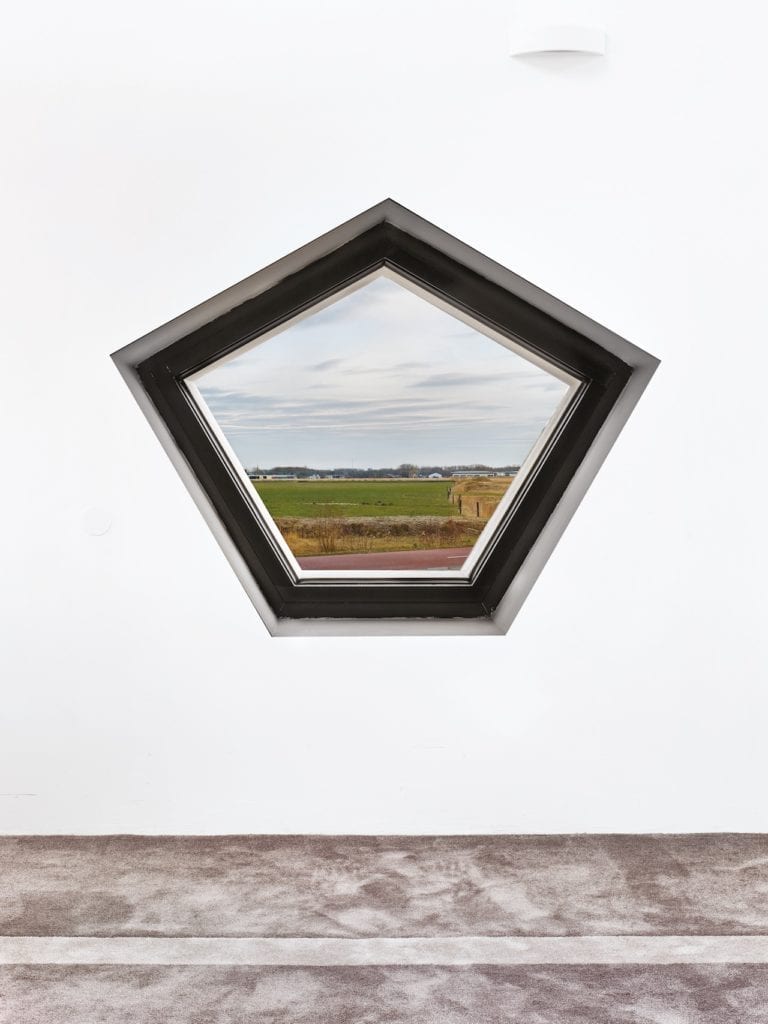People of Muslim faith are among the most discriminated minorities in the West, and the generalisations and stereotypes associated with the culture have resulted in the religion being widely misunderstood, reduced to sensationalised media definitions and reductive tropes.
As a Swiss-born Muslim living in the Netherlands, Marwan Bassiouni set out to remedy these misleading associations, instead highlighting the diversity within his country’s array of Islamic practitioners. The resulting project, New Dutch Views, is now on show at Fotomuseum Den Haag, and published in a photobook.
Bassiouni travelled to Dutch mosques established by a range of cultural groups from all over the world. Each of his images is taken looking out of a mosque window, revealing the building’s interior while also presenting a view of a Dutch landscape. Through this interplay of visuals, he commentates on the organic symbiosis of culture, despite the perpetuation of stereotypes.
“In the last 60 or 70 years, there have been more and more Muslims living in the West,” he explains. “When I came across the windows in these different structures and saw the landscape through them, I began contemplating what it means to look at the landscape we share through a mosque, placing everyone’s point of view inside of it.”

Bassiouni’s travels also expanded his own perception of the religion he shares with the communities he encountered. “I have not only witnessed the diversity of locations in which Muslims are living today, but also the diversity within the religion itself,” he says. “Muslims in the Netherlands are everything from Moroccan, Turkish, Dutch, Surinamese, Egyptian, Somali, Iraqi, Iranian, Indonesian, Tunisian and Pakistani, to name the most common, and each of them have their own customs and mosque aesthetics.”
This diversity results in a range of interior ornamentation, with varying window shapes and sizes, all surrounded by decorative embellishments which frame the viewer’s outward gaze onto even further differentiations between the Dutch landscape. “What I hope is that by looking through all the images, you can actually look at the whole landscape of the country, whether urban or the countryside, but from inside the mosque.”

Throughout his travels, Bassiouni was pleased to see that the structures embraced their Dutch surroundings, evolving into new forms of aesthetics and practice. “There is an actual Dutch mosque architectural identity that’s come out of the culture,” he says. “Dutch mosques are all made out of bricks, and sometimes on the outside you can’t recognise them. The Dutch Muslim identity has been given a certain space and place in the culture.”
After finding the perfect window, Bassiouni figured out the best time of day to photograph with ambient light. By illustrating the amalgamation of cultures, the focus is less on difference and more on organic alliance. “I’m more interested in the similarities between a Muslim person and a non-Muslim person,” Bassiouni explains. “I want to look at people’s common ground rather than their differences.”

By creating a visual demonstration of this hybrid culture, Bassiouni subverts the aggressive media stereotypes that have come to permeate Western generalisation of Islam and its people. “Islam is not really an ‘other’ – Islam is an ‘us’ now,” he says. “And that’s what’s important for me. The issue of feeling at home in the West when you’re not necessarily the majority is a very complicated feeling, and that’s what Muslim people have to deal with. But it’s not just Muslim people. This work is about accepting that there are all kinds of Dutch identities.”
This sentiment is embodied in the series title, which is a direct commentary
on the antiquated desire to preserve some semblance of traditional Dutch culture and practice despite the country’s constant evolution. “The title is a statement about Dutch national identity: what is it? I’m not saying that these are the only new Dutch views, but that these views should be perceived as Dutch – Islam is Dutch. I don’t feel that photography is necessarily a way of making this notion real. For me, the issue itself is real, and photography is a way of captivating someone’s attention to think about it.”
New Dutch Views by Marwan Bassiouni is on show at Foto Museum Den Haag until 01 September 2019. Limited copies of his book are available through his website.
–
This article was originally published in issue #7877 of British Journal of Photography magazine. Visit the BJP Shop to purchase the magazine here.
